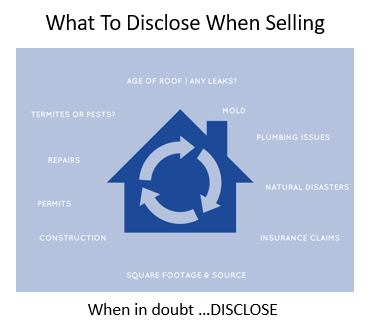
So... how much should you tell your home's new owners?
The best way to approach this question and what to disclose in the the Sellers Property Information Statement (SPIS) is to ask yourself yourself the question "Would I want to know about the issue in question"?. If the answer is yes, then disclose it. So here are a few examples of what you should/no need to disclose:
- Be honest about any issues with the home's appliances and operating systems. Are you aware of any structural defects? If you've had problems with a leak in the roof, let the buyers know. Save all receipts for any repairs.
- A bathtub drain that's slow is something that should be fixed. Fixing a slow drain or a leaky faucet is routine maintance. Once repaired, it doesn't have to be disclosed.
- If there is any water damage, then it must be disclosed. You'll need to tell the buyers where the water damage occurred. Did floors and drywall have to be replaced? How soon were the repairs made?
- Mold is always a concern when there's water damage. The moisture can create an environment that allows it to grow. If you suspect mold, hire a licensed Mold Inspector to perform the necessary tests and you will want someone who will warranty their work for at least a year or two. Ultimately, you will need a "clean mold test" to show the buyers.
- If your home is involved in construction defect litigation, it must be disclosed. This includes litigation filed by the Homeowner's Association on behalf of the community.
- Kitec plumbing is an issue for some houses. I know on our sub division alone, some houses have it, some do not. If you do have it, you have some decisions to make before listing our home because it isn't a question of "if" it will have a leak but "When". Any licensed home inspector should be able to tell if a home has Kitec. Sellers should always disclose if their home had it and if it's been replaced. Take a peek at my video for some quick advice on your first steps to dealing with Kitec if you think you have it.
Disclose, Disclose, Disclose
These are only some of the items that can create problems if you fail to disclose them. Another common issue I see is having work done on the home without proper permits. This is a situation that may even prevent the buyer from qualifying for their mortgage if the illegal work is discovered.
Sellers who haven't lived in the property are well advised to disclose everything they know. If a tenant has lived in the home the seller will probably only know about things the tenants reported. No one expects sellers to disclose things they don't know. They must report anything they're aware of. Make sure the property manager keeps a record of all repairs, improvements, etc. They will be useful when selling a home long distance.
It is in your best interest as well as the buyers if you disclose all pertinent details. This allows the buyers to have the problem inspected and make an informed decision about purchasing your home. Make sure to avoid any pre-sale and staging tricks. The buyers may not discover the issues during their inspection but they will when they move in. Then you could be liable for much more than the cost of the repairs.
Justin
